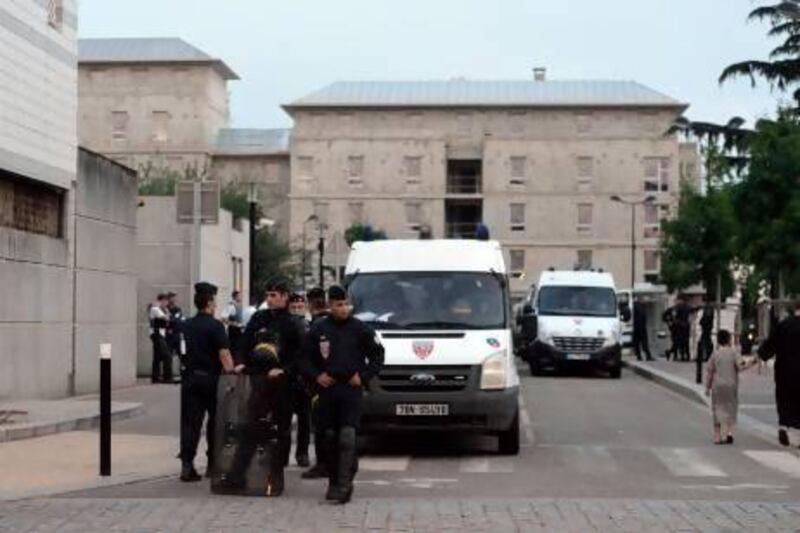A hot summer is the policeman's foe, say law officers patrolling troubled housing estates full of angry young men of immigrant origin.
And as temperatures in France reached record, sustained highs of more than 30°C even in the north and west, the constant tensions between authority and the country's large Muslim population boiled over into three nights of rioting.
In Trappes, a town in Paris's western suburbs where the violence erupted, the immediate issue was the manner in which police carried out an identity check on a young mother of French West Indian background wearing a niqab in defiance of a 2010 law that bans face-covering headgear in public. Scores of young people took to the streets as Ramadan fasting was broken by iftar; cars were set alight, police were bombarded with makeshift projectiles and several arrests were made.
According to one community leader, Othman Nasrou, president of the Trappes Citizens' Association, any number of other grievances might as easily have provided the spark.
"Here, people feel abandoned," he told the daily newspaper Le Figaro. "Promised urban renewal has been purely cosmetic and done nothing to remedy fundamental problems. Unemployment among the young exceeds 40 per cent in some areas and we see forces of law only when things go wrong."
Official accounts of the incident stand entirely at odds with those of the woman, her family and the Collective Against Islamophobia in France (CCIF). Police say they were violently attacked by her partner, who was arrested. The woman, cited by CCIF, insists she was ready to lift her veil to identify herself but was insulted by an officer who also pushed her mother sharply.
Whatever the truth, the events - and the choices people made when deciding which version to believe - once again highlight bitter divisions in French society.
In the same way that many people here feel threatened by what they regard as alien cultures, the offspring of Maghrebin and sub-Saharan African immigrants too often feel no attachment to France, even when it is their country of birth.
"I grew up in a Parisian suburb," says a young black athlete, now living in the south of France. "The biggest and most depressing problem is that these young people don't feel French and see no reason why they should."
The niqab issue offers a case in point. Fewer than 2,000 women are thought to wear face-covering clothes, yet police are under pressure to apply the law, leaving Muslims feeling they have been disproportionately targeted. In its first year of operation, the law led to 661 penalties being issued against 423 women, some for repeated offences.
France has also been shocked by reports that young people from an estate populated in part by Muslim immigrant families near the station at Brétigny-sur-Orge, 26 kilometres south of the centre of Paris, where a train derailed on July 12 killing six people, pelted rescue workers with objects and even stole from victims.
It hardly matters that socialist politicians and community spokesmen have urged caution in public comments on actions they say were committed by a handful of troublemakers at most. Some voters will remember more clearly the words of Christophe Crépin, a police union spokesman cited by Le Figaro: "There were some people losing arms or legs, and others who came to steal their watches or mobile phones."
Nor do many outside the left-wing parties and lobby groups pay great attention to the grievances of Muslims who feel discriminated against and excluded from a society into which they are implored to integrate.
Centre-right politicians are more concerned with the perceived failure of government to combat challenges to authority - and what they see as authority's tendency to downplay inconvenient truths about antisocial behaviour.
The rioting in Trappes and alleged looting at the rail crash scene show that for some, the law of their own communities is superior to that of the republic, Eric Ciotti, a member of parliament for the opposition Union pour un Mouvement Populaire (UMP), told Le Journal du Dimanche.
One radical solution, a return to obligatory military service for school-leavers, abandoned 17 years ago, so far appeals to few politicians beyond the far-right Front National. But a 2012 poll found 62 per cent of the French regretted the end of conscription, and the subject frequently comes up among young professionals genuinely worried by rifts in society.
"It could even be community service rather than military-based," says a physiotherapist from the northern city of Lille. "The key is to make all participants, whatever their backgrounds, feel they are in it together."
An uneasy calm has returned to the streets of Trappes by night, but few doubt that another contentious incident could see trouble flare again, there or in other suburbs, called banlieues, where the tensions have risen with the temperatures.
For the interior minister, Manuel Valls, there is at least a new distraction from the need to appear tough on disturbances and supportive of law enforcement agencies.
Mr Valls, seen as a potential successor to the deeply unpopular François Hollande as socialist president, has condemned a mayor's intemperate attacks on a group of travellers, of assorted ethnic origin, who illegally occupied council-owned land in the western town of Cholet.
Greeted by Nazi salutes by some of those he wished to disperse, Gilles Bourdouleix, who also sits in parliament as a centrist MP, exclaimed, apparently referring to Roma: "Perhaps Hitler didn't kill enough of them."
The ensuing furore leaves Mr Valls caught between calling for a sharp judicial response to the mayor's outburst without appearing to support the unlawful settlements of travellers and Roma. And for once, Muslim immigrants cannot be blamed.
foreign.desk@thenational.ae
twitter: For breaking news from the Gulf, the Middle East and around the globe follow The National World. Follow us







